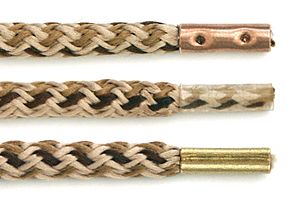Aglet facts for kids
An aglet is the small tip you find at the end of a shoelace or a rope. It's usually made of plastic or metal. Its main job is to stop the fibres of the lace or rope from coming apart, which is called fraying. This little tip also makes it much easier to push the shoelace through small holes, like the eyelets on your shoes.
Contents
What Does "Aglet" Mean?
The word aglet comes from an old French word, aguillette. This word means "needle." It's also linked to the Latin word acus, which also means "needle." So, an aglet is like a tiny needle at the end of a cord, helping it go through small spaces.
Different Kinds of Aglets
Aglets can be divided into two main types:
- Functional Aglets: These are the most common type. Their only purpose is to stop the end of a shoelace or rope from fraying. They make it easier to tie your shoes or use a rope.
- Decorative Aglets: Some aglets are made to look fancy. You might see them on special cords, like those on bolo ties or on the uniforms worn by soldiers. These aglets are often made from shiny metals like silver.
Materials Used for Aglets
Today, most aglets are made of plastic. However, they have been made from many other materials throughout history. These include metal, glass, and even stone. In the past, some aglets were very fancy and made of valuable metals. Before buttons were invented, aglets were sometimes used on the ends of ribbons to hold clothes together. Sometimes, they were even shaped into tiny figures. The famous writer William Shakespeare once called these "aglet babies" in one of his plays.
Making Your Own Aglets
If you need an aglet in a hurry, you can make one at home! People have used different simple materials for this. Some common ways include using adhesive tape, wax, resin, or glue. You can also use thread to wrap around the end of a lace. Another method is to use heat shrink material or small pieces of metal tubing. Sometimes, just tying a knot or carefully melting the end of a synthetic lace can work too. During the Great Depression, when money was scarce, people even made aglets from paper and glue.
See also
 In Spanish: Herrete para niños
In Spanish: Herrete para niños
 | Sharif Bey |
 | Hale Woodruff |
 | Richmond Barthé |
 | Purvis Young |


